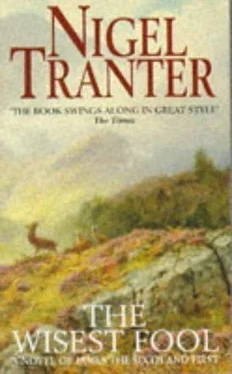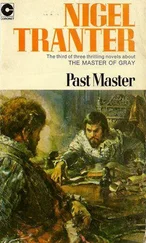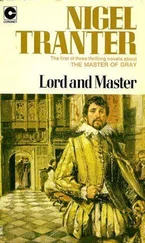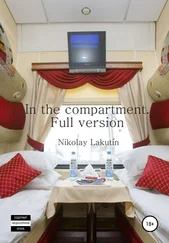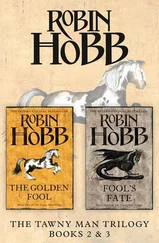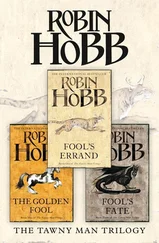Nigel Tranter - The Wisest Fool
Здесь есть возможность читать онлайн «Nigel Tranter - The Wisest Fool» весь текст электронной книги совершенно бесплатно (целиком полную версию без сокращений). В некоторых случаях можно слушать аудио, скачать через торрент в формате fb2 и присутствует краткое содержание. Жанр: Исторические приключения, на английском языке. Описание произведения, (предисловие) а так же отзывы посетителей доступны на портале библиотеки ЛибКат.
- Название:The Wisest Fool
- Автор:
- Жанр:
- Год:неизвестен
- ISBN:нет данных
- Рейтинг книги:4 / 5. Голосов: 1
-
Избранное:Добавить в избранное
- Отзывы:
-
Ваша оценка:
- 80
- 1
- 2
- 3
- 4
- 5
The Wisest Fool: краткое содержание, описание и аннотация
Предлагаем к чтению аннотацию, описание, краткое содержание или предисловие (зависит от того, что написал сам автор книги «The Wisest Fool»). Если вы не нашли необходимую информацию о книге — напишите в комментариях, мы постараемся отыскать её.
The Wisest Fool — читать онлайн бесплатно полную книгу (весь текст) целиком
Ниже представлен текст книги, разбитый по страницам. Система сохранения места последней прочитанной страницы, позволяет с удобством читать онлайн бесплатно книгу «The Wisest Fool», без необходимости каждый раз заново искать на чём Вы остановились. Поставьте закладку, и сможете в любой момент перейти на страницу, на которой закончили чтение.
Интервал:
Закладка:
"Ooh, aye. Though, mind, a guid head for the liquor is the main thing. Never play the cartes wi' a birling heid. One thing we Scots can teach them, eh? Och, but you dinna play them anyhow, do you?"
"No, She. Money is my trade, not my amusement So I respect it."
"Nae mah'n do I, lad-nae mair'n do I. And dinna sound sae a'mighty smug. Na, na-sit still. Dinna go yet, man. I've news for you. Frae Scotland. Right interesting news." "Good news, Sire? Or ill?"
"That's maybe a matter o' opinion. You, now-you, I jalouse, hae something o' a shamefu' liking for yon rogue Patrick Gray, hae you no'?"
"Gray? I do not rightly know, Sire. I admit he is a very dangerous man. And too clever, by far. But he has his points, too. A, a strange urbanity. His principles may be but ill ones-but he holds to them."
"You think so? He has aye held to treasons, rebellions, plots, subornings, betrayals. If you can ca' such principles! Piracy, too -wrecking. Hae you heard tell what he and thae graceless kin o' mine in Orkney hae been at? Changing the beacons on the islands that guide the ships, to lure in honest mariners to the rocks. So they can plunder them. For money and arms and gear to raise rebellions against me I To pay for French arms. Aye, but the French ships get in safe enough! Devils, they are-just devils. The wet sea! But-och, I've put a spoke or two in that wheel, to be sure."
"There has been talk of this of arms, mercenaries, from France, invasion and the like, for long now, Sire. And little to show for it. Think you it is in truth anything more than a tale? Put out by Gray, no doubt. For his own ends. To alarm, win over faint-hearts, gain concessions perhaps…?"
"Och, aye-it's mair'n a tale, Geordie. I ken fine what's been going on. It's maybe no sae great a matter as has been made out- but invasion was planned, to be sure. Much arms sent I've a wheen folk wi' sharp ears in France, as well as had Patrick, mind." James shrugged those grotesquely padded shoulders. "But-a' that's done wi'. By wi', man. There'll be nae invasion, now. Nae uprising and fell insurrection in my auld realm o' Scotland. We can a' sleep quiet in our naked beds, now, Geordie. For the man's deid." "Dead…?" Heriot stared.
"Aye, just that. Deceased. On his way to hell, belike! Mind you, I'll miss him."
"But… but… you mean the Master? Lord Gray? Gray- dead?"
"Patrick, aye. Verra sudden."
The other moistened his lips and looked round that shambles of a pavilion, as though for means of escape. "I cannot… take it in, Sire!" he muttered. "Patrick Gray! He was, I think, no older than am I. And of excellent health. How-how did he die?"
"It seems to have been fell sudden. The hand o' Almighty God, nae doubt. It aye catches up wi' evil doers, sooner or later, mind. A stroke, they tell me. Aye, a stroke, just"
"Not the stroke of steel! Or bullet?"
"No' so as I've heard tell. In his bed, in his ain house o' Castle Huntly. Ooh, aye-the Lord's ways are wonderfu' and mysterious for to behold."
"The Earl of Dunbar died in his bed, also, Sire, did he not- equally mysterious and wonderful! A strange… coincidence!"
"So it is, Geordie-so it is. I hadna thought on that But-a' for the best, mind. Patrick had had his day-like Doddie. Time they moved on, I'm thinking. For the weei o' the realm. Aye- aut non tentaris aut perfice!"
There was silence in that tent for a little, save for the snorings and gruntings.
'You seem hard stricken, Geordie-over one o' your lord's enemies!" the King observed presently but not censoriously. "I reckon you had a soft side for the man. So had I, mind-so had I. Or is it Vicky's lassie, Mary Gray, you're consairned for? Or my bonnie cousin Marie. Your sentiments do you credit, Geordie. But… the women will get ower it Like the rest o' us."
"I, I just cannot seem to accept it, Sire. There is something amiss, here."
'You think so? Mind, if it hadna been our Vicky in charge up there, I'd hae let my mind dwell on the thought o' poison, maybe! But, och-Vicky wouldna do sic like a thing. No' wi' Mary Gray in it And Vicky is a right honourable duel, you'll agree? Na, na-we can rule out poison, eh? It's just the hand o' God, as I say."
Heriot looked his royal master in the eye, and said nothing.
"Sae that's it, Geordie. That's my news. And a' will be a deal better in Scotland, now-nae doubt o' that There's no' another Patrick Gray. My Orkney kin will sink like pricked bladders, wi' him gone! So simple a solution, eh? Simple, aye. It gars you think! Waesucks-maybe we're no' simple enough often enough. Aye, well-awa' wi' you, Geordie-and meditate on the ways o' the Lord!"
Abruptly Heriot rose, bowed jerkily and turned to go.
"Dinna forget the gewgaws and the siller, man," James reminded. "Use the Archduke's cloak to bundle it in-he owes me mair'n that, anyway."
With his heavy and awkward bundle, Heriot paused at the tent door as the King spoke again.
"I'm going to miss him, mind. It'll no' be the same without him-no' the same, at all. A guid night to you, Geordie Heriot."
A man in chaos of emotions, George Heriot went seeking his Alison. He wanted to go home.
Интервал:
Закладка:
Похожие книги на «The Wisest Fool»
Представляем Вашему вниманию похожие книги на «The Wisest Fool» списком для выбора. Мы отобрали схожую по названию и смыслу литературу в надежде предоставить читателям больше вариантов отыскать новые, интересные, ещё непрочитанные произведения.
Обсуждение, отзывы о книге «The Wisest Fool» и просто собственные мнения читателей. Оставьте ваши комментарии, напишите, что Вы думаете о произведении, его смысле или главных героях. Укажите что конкретно понравилось, а что нет, и почему Вы так считаете.
